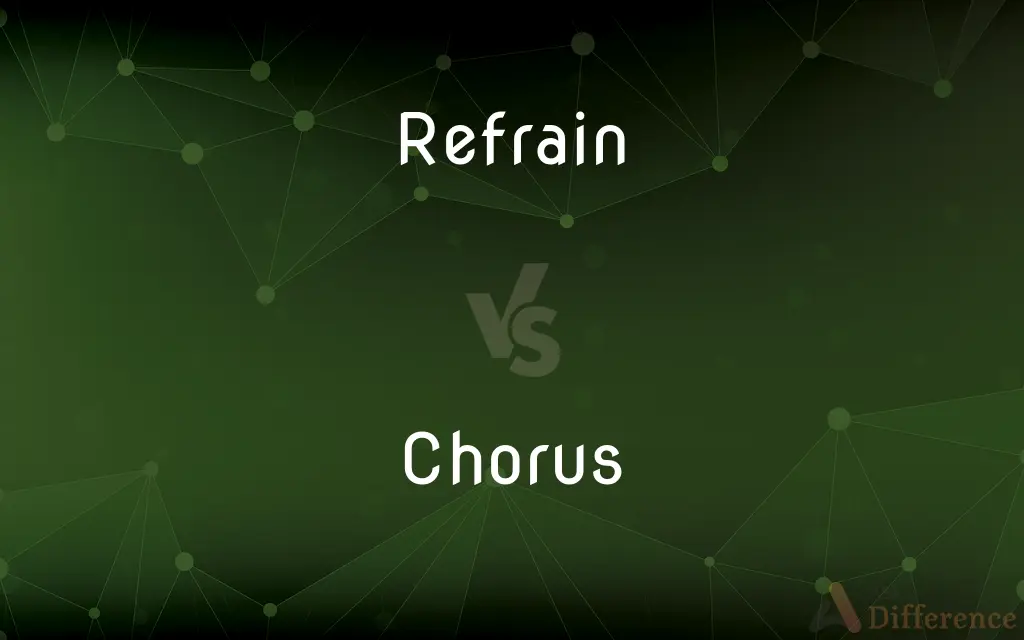Refrain vs. Chorus — What's the Difference?
Edited by Tayyaba Rehman — By Fiza Rafique — Updated on September 22, 2023
A refrain is a line or set of lines that appears at the end of a verse in a song or poem and is repeated at regular intervals. A chorus is a distinct section of a song that is usually repeated and typically contains the song's main message or theme.

Difference Between Refrain and Chorus
Table of Contents
ADVERTISEMENT
Key Differences
Refrains are lines that repeat at the end of each verse in a song or poem, serving as an anchor or summary. Choruses are standalone sections that break up the verses, emphasizing the song's central message and generally providing a contrast to the verse.
Refrains can often be shorter than choruses, sometimes just being a line or phrase. In contrast, choruses tend to be more elaborate, often encapsulating the song's main message or theme, thus providing a highlight in the song's structure.
In a refrain, the repetition of lines is meant to add poetic or musical weight to the song or poem. Choruses, however, act as the hook that engages listeners, offering the most memorable and often catchy parts of the song.
Refrains can be found in various types of poetry and songs, not just limited to pop or rock music. Choruses, meanwhile, are more specific to songs and are a fundamental part of their structure, often steering the direction of the song.
Refrains don't always have to be identical throughout the song; they can slightly change with context. Choruses, on the other hand, usually remain constant throughout the song to ensure memorability and listener engagement.
ADVERTISEMENT
Comparison Chart
Position
End of verses
Separate section between verses
Length
Often shorter
Usually longer
Purpose
Anchor or summary
Main message or theme
Variability
Can change slightly
Usually remains constant
Occurrence in Literature
Found in songs and poetry
Mostly found in songs
Compare with Definitions
Refrain
Adds poetic weight.
The refrain was both poignant and meaningful.
Chorus
Contains the main message.
The chorus encapsulated the song's theme.
Refrain
Can change slightly.
The refrain evolved with each verse.
Chorus
A part of a song which is repeated after each verse
Strong guitar-driven songs with big, big choruses
Refrain
A repeated line at the end of each verse.
The refrain added emphasis to the song's message.
Chorus
A large organized group of singers, especially one which performs with an orchestra or opera company
He has words of praise for the RSNO Chorus
Refrain
Can be short or long.
The refrain was just a single sentence.
Chorus
A simultaneous utterance of something by many people
‘Good morning,’ we replied in chorus
A growing chorus of complaint
Refrain
A refrain (from Vulgar Latin refringere, "to repeat", and later from Old French refraindre) is the line or lines that are repeated in music or in poetry — the "chorus" of a song. Poetic fixed forms that feature refrains include the villanelle, the virelay, and the sestina.
Chorus
(in ancient Greek tragedy) a group of performers who comment together on the main action
Sophocles no longer gave the chorus the major role
Refrain
To hold oneself back; forbear from doing something
Refrained from swearing.
Chorus
A device used with an amplified musical instrument to give the impression that more than one instrument is being played
A chorus pedal
Refrain
A phrase, verse, or group of verses repeated at intervals throughout a song or poem, especially at the end of each stanza.
Chorus
(of a group of people) say the same thing at the same time
‘Morning, Sister,’ the nurses chorused
Refrain
Music for the refrain of a song.
Chorus
A group of singers who perform together, usually singing multi-part compositions with more than one singer for each part.
Refrain
A song or melody.
Chorus
A group of vocalists and dancers who support the soloists and leading performers in operas, musical comedies, and revues.
Refrain
A repeated utterance or theme.
Chorus
A musical composition usually in four or more parts written for a large number of singers.
Refrain
To hold back, to restrain (someone or something).
Chorus
A refrain in a song, especially one in which the soloist is joined by other performers or audience members.
Refrain
To show restraint; to hold oneself back.
Chorus
A solo section based on the main melody of a popular song and played by a member of the group.
Refrain
To repress (a desire, emotion etc.); to check or curb.
Chorus
A group of persons who speak or sing in unison a given part or composition in drama or poetry recitation.
Refrain
To stop oneself from some action or interference; to abstain.
Chorus
An actor in Elizabethan drama who recites the prologue and epilogue to a play and sometimes comments on the action.
Refrain
To abstain from (food or drink).
Chorus
A group in a classical Greek drama whose songs and dances present an exposition of or, in later tradition, a disengaged commentary on the action.
Refrain
The chorus or burden of a song repeated at the end of each verse or stanza.
Chorus
The portion of a classical Greek drama consisting of choric dance and song.
Refrain
(by extension) A much repeated comment, complaint, or saying.
Chorus
A speech, song, or other utterance made in concert by many people.
Refrain
To hold back; to restrain; to keep within prescribed bounds; to curb; to govern.
His reason refraineth not his foul delight or talent.
Refrain thy foot from their path.
Chorus
A simultaneous utterance by a number of people
A chorus of jeers from the bystanders.
Refrain
To abstain from.
Who, requiring a remedy for his gout, received no other counsel than to refrain cold drink.
Chorus
A simultaneous production of sound by numerous animals
The midday chorus of cicadas.
Refrain
To keep one's self from action or interference; to hold aloof; to forbear; to abstain.
Refrain from these men, and let them alone.
They refrained therefrom [eating flesh] some time after.
Chorus
A simultaneous production of sound by numerous inanimate objects
A chorus of lawnmowers from the neighborhood's backyards.
Refrain
The burden of a song; a phrase or verse which recurs at the end of each of the separate stanzas or divisions of a poetic composition.
We hear the wild refrain.
Chorus
To sing or utter in chorus.
Refrain
The part of a song where a soloist is joined by a group of singers
Chorus
A group of singers and dancers in a theatrical performance or religious festival who commented on the main performance in speech or song.
Refrain
Not do something;
He refrained from hitting him back
She could not forbear weeping
Chorus
A song performed by the singers of such a group.
Refrain
Choose no to consume;
I abstain from alcohol
Chorus
An actor who reads the prologue and epilogue of a play, and sometimes also acts as a commentator or narrator; also, a portion of a play read by this actor.
Refrain
Found in songs and poetry.
The poet used a refrain to tie the stanzas together.
Chorus
A group of singers performing together; a choir; specifically, such a group singing together in a musical, an opera, etc., as distinct from the soloists; an ensemble.
The performance of the chorus was awe-inspiring and exhilarating.
Chorus
(by extension) A group of people in a performance who recite together.
Chorus
An instance of singing by a group of people.
Chorus
(figuratively)
Chorus
A group of people or animals who make sounds together.
A chorus of crickets
A chorus of whiners
Chorus
The noise or sound made by such a group.
A chorus of shouts and catcalls
Chorus
(music)
Chorus
A piece of music, especially one in a larger work such as an opera, written to be sung by a choir in parts (for example, by sopranos, altos, tenors, and basses).
Chorus
A part of a song which is repeated between verses; a refrain.
The catchiest part of most songs is the chorus.
Chorus
The main part of a pop song played after the introduction.
Chorus
A group of organ pipes or organ stops intended to be played simultaneously; a compound stop; also, the sound made by such pipes or stops.
Chorus
A feature or setting in electronic music that makes one instrument sound like many.
Chorus
(Christianity) A simple, often repetitive, song intended to be sung in a group during informal worship.
Chorus
(jazz) The improvised solo section in a small group performance.
Chorus
(transitive)
Chorus
To sing (a song), express (a sentiment), or recite or say (words) in chorus.
Chorus
To express concurrence with (something said by another person); to echo.
Chorus
(rare) To provide (a song) with a chorus or refrain.
Chorus
(intransitive)
Chorus
To sing the chorus or refrain of a song.
Chorus
To sing, express, or say in, or as if in, unison.
Chorus
To echo in unison another person's words.
Chorus
Of animals: to make cries or sounds together.
Chorus
A band of singers and dancers.
The Grecian tragedy was at first nothing but a chorus of singers.
Chorus
A company of persons supposed to behold what passed in the acts of a tragedy, and to sing the sentiments which the events suggested in couplets or verses between the acts; also, that which was thus sung by the chorus.
What the lofty, grave tragedians taughtIn chorus or iambic.
Chorus
An interpreter in a dumb show or play.
Chorus
A company of singers singing in concert.
Chorus
A composition of two or more parts, each of which is intended to be sung by a number of voices.
Chorus
Parts of a song or hymn recurring at intervals, as at the end of stanzas; also, a company of singers who join with the singer or choir in singer or choir in singing such parts.
Chorus
The simultaneous of a company in any noisy demonstration; as, a Chorus of shouts and catcalls.
Chorus
To sing in chorus; to exclaim simultaneously.
Chorus
Any utterance produced simultaneously by a group;
A chorus of boos
Chorus
A group of people assembled to sing together
Chorus
The part of a song where a soloist is joined by a group of singers
Chorus
A body of dancers or singers who perform together
Chorus
A company of actors who comment (by speaking or singing in unison) on the action in a classical Greek play
Chorus
Utter in unison;
`yes,' the children chorused
Chorus
Sing in a choir
Chorus
A separate section in a song.
The chorus was the most memorable part.
Chorus
Usually repeated.
The chorus repeated after every verse.
Chorus
Meant to engage the listener.
The catchy chorus got everyone singing along.
Chorus
Typically remains constant.
The chorus was identical in each repetition.
Common Curiosities
Can a song have both a refrain and a chorus?
Yes, some songs include both elements.
Is a chorus repeated?
Typically, yes, it repeats between verses.
Can a refrain change in a song?
It can vary slightly, depending on the song's structure.
Is the chorus always catchy?
While not a rule, choruses are often designed to be memorable.
Is a refrain always shorter than a chorus?
Not always, but refrains are often shorter.
Is the chorus the main part of the song?
It usually contains the song's main message or theme.
Is a refrain the same as a hook?
No, a hook is a catchy part that may or may not be the refrain.
Do all songs have a chorus?
Most popular songs do, but not all musical styles use a chorus.
Can a refrain be found in poetry?
Yes, refrains are common in both songs and poetry.
Can you skip the refrain in a song?
Technically, yes, but it serves a specific purpose.
Do all songs have a refrain?
No, not all songs use a refrain.
Can a refrain be a whole stanza?
Yes, it can vary in length.
Is the refrain always at the end of a verse?
Traditionally, yes, but there can be exceptions.
Can a chorus be the title of the song?
Often, the song's title is derived from the chorus.
Can a chorus be at the beginning of a song?
While unusual, it's possible in some song structures.
Share Your Discovery

Previous Comparison
Pretty vs. Prettily
Next Comparison
Workshop vs. StudioAuthor Spotlight
Written by
Fiza RafiqueFiza Rafique is a skilled content writer at AskDifference.com, where she meticulously refines and enhances written pieces. Drawing from her vast editorial expertise, Fiza ensures clarity, accuracy, and precision in every article. Passionate about language, she continually seeks to elevate the quality of content for readers worldwide.
Edited by
Tayyaba RehmanTayyaba Rehman is a distinguished writer, currently serving as a primary contributor to askdifference.com. As a researcher in semantics and etymology, Tayyaba's passion for the complexity of languages and their distinctions has found a perfect home on the platform. Tayyaba delves into the intricacies of language, distinguishing between commonly confused words and phrases, thereby providing clarity for readers worldwide.














































